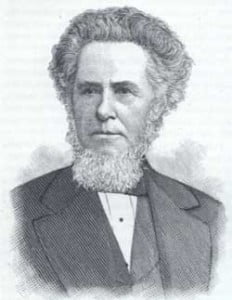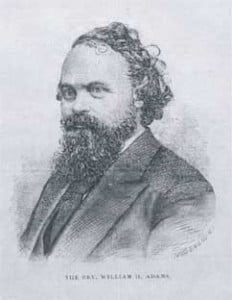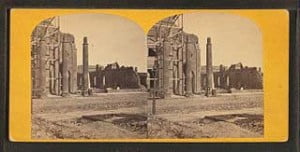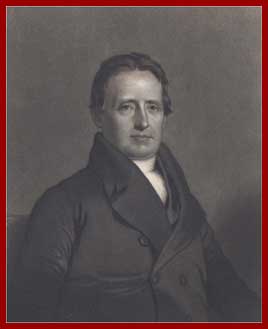On this date, January 7, 1850, Dr. Samuel Miller, distinguished Professor at the Princeton Theological Seminary, passed into his eternal reward. Our readers may well know something of Dr. Miller and his long career as Professor at the Princeton Theological Seminary. But in the years prior to that appointment, from 1793 until 1813, Rev. Miller served as a pastor in New York City. Here below is an account of his ordination, reading from the Presbytery records. It is interesting to see the requirements expected of a candidate for the ministry in the late 18th century, and also to compare the general order of ordination then, with how it is done today.
Samuel Miller was born in 1769, the fourth son of the Rev. John Miller, and later graduated with honors from the University of Pennsylvania, in 1789. Under the direction of his father, he studied theology privately in preparation for the ministry, as was typical in that era. He was subsequently licensed to preach by the Presbytery of Lewes, in Delaware, where his father had long been a leading member.
After the death of his father in the summer of 1791, his father’s congregation extended a call to Miller, in the spring of 1792, to serve that congregation as its next pastor. He declined that call, and instead answered a unanimous call from the United Presbyterian churches of New York City, in 1793.
What follows is an account of young Samuel Miller’s ordination, extracted from the Minutes of the Presbytery of New York—
At South Hanover, January 15th, 1793. Mr. Samuel Miller appeared before the Presbytery, and produced an extract of a minute of the Presbytery of Lewes, setting forth that the United Congregations in New York had brought before them a call for Mr. Miller, and that, having been put in his hands, he had accepted of it, and containing a dismission and recommendation of Mr. Miller ; and he was received under the care of the Presbytery.
Mr. Van Gelder, a commissioner from the United Congregations in New York, requested the Presbytery to take the necessary steps for Mr. Miller’s ordination as soon as possible. And the Presbytery examined him as to his experimental acquaintance with religion, and his views in entering the ministry, in which he was approved.
January 16th, 1793.—Mr. Carle and Mr. Miller were examined in Latin and Greek, in geography, logic, rhetoric, natural philosophy, astronomy, moral philosophy, divinity, ecclesiastical history, and church government, in all which they were approved.
Mr. Miller was appointed to prepare a sermon on Rom. iii. 24, and an Exegesis on “An Christus post mortem ejus, in gehennam descenderit?”
At Orangedale, May 7th, 1793. The Presbytery was opened with a sermon by Mr. Samuel Miller, from Rom iii. 24.
The Presbytery having heard Mr. Samuel Miller’s Exegesis, sustained it and his sermon preached at the opening of Presbytery.
May 9th, 1793. The Presbytery agreed to ordain Mr. Samuel Miller, and install him on Wednesday the 5th of June, at 10, A. M., and appointed Dr. McKnight to preach, Dr, Rodgers to preside, and Dr. McWhorter to give the exhortation to the people.
At New York, June 5th, 1793. The Presbytery proceeded to the ordination of Mr. Miller. Dr. McKnight preached from 2 Cor. iv. 5 ; and Mr. Miller, having answered the prescribed questions, was set apart to the work of the gospel ministry, by prayer and the laying on [of the hands] of the Presbytery, and installed as co-pastor with Dr. Rodgers and Dr. McKnight of the United Presbyterian Congregations in New York; after which Dr. McWhorter gave an exhortation to the people, and Mr. Miller took his seat in Presbytery. [1]
A true copy of the minutes.
JOHN M. KREBS. Stated Clerk
New York, March 5th, 1852.
[1] There is no record of the charge to the pastor, it being probably included in the sermon.
Words to Live By:
“Let not many of you become teachers, my brethren, knowing that as such we will incur a stricter judgment.” (James 3:1). For those who are truly called of God to serve as under-shepherds of the Lord’s people, it is a terrifying, yet inescapable calling and obligation. Where a man takes on this mantle lightly or with little consideration, it is a good indication that he is not truly called. True shepherds must exhibit great humility and piety, great courage in the face of inevitable opposition, and a great love of the Lord and of His elect people. It is a calling which can only be accomplished by the empowering grace of God. Pray for your pastors!






